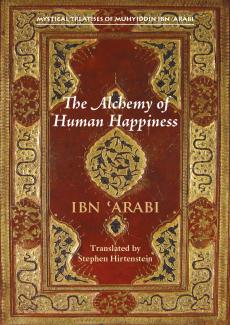
The Alchemy of Human Happiness
Overview
The quest for happiness and fulfilment lies at the very heart of human life, but for Ibn ʿArabi there is a realm beyond our ordinary understanding of happiness, where the human stands truly fulfilled, in vision of Reality. This is a goal within the potential of every person.
‘Not everyone who has found happiness is accorded perfection, for while all who are perfect are happy, not every happy one is perfect. Perfection means reaching and joining with the highest degree, and that is assuming the likeness of the Source.’
In this first English translation of a core chapter from the famous Meccan Illuminations (al-Futūḥāt al-Makkiyya), Ibn ʿArabi comprehensively summarises all his major teachings on human perfectibility and true happiness. Using the imagery of alchemy and ascension, he gives the reader an extraordinary insight into the spiritual journey by contrasting two ways of acquiring knowledge: the rational and the mystical. With an introduction to Islamic alchemy, the Hermetic tradition and the mysterious elixir, this is an important text for anyone interested in Sufism, Islamic spirituality or alchemy.
Endorsements
The Alchemy of Human Happiness is a major contribution to the study of Ibn ʿArabi in English. For researchers, Stephen Hirtenstein’s translation and his accompanying introduction and notes will enhance the study of the relationship between classical Sufism and the premodern sciences, a lacuna in Islamic studies. For students and their teachers, The Alchemy of Human Happiness will serve as an excellent introduction to the reinterpretation of Neoplatonism and Hermeticism within the context of Islamic and Sufi cosmologies. And for the interested reader, the lucidity of this work will make for a fulfilling learning experience. Most important, Hirtenstein’s mastery of Ibn ʿArabi’s corpus results in an invaluable translation.
The Alchemy of Human Happiness (chapter 167 of Ibn ‘Arabi’s immense Meccan Illuminations) is an extraordinary 'road-map' of the process of spiritual ascension through all the levels of existence, carefully highlighting at each stage the indispensable role of the devoted practice and interiorization of the revealed guidance of the Prophet Muhammad and earlier prophetic messengers and guides. One of the most challenging chapters of the entire Futūhāt, it constantly intertwines complex allusions to the Qur’an and hadith, alchemy, medicine, Ptolemaic cosmology, embryology, and classical Sufi discussions of spiritual psychology and guidance. Yet Stephen Hirtenstein’s clear, polished English translation of this key section and his careful, essential annotation make this one of the most accessible, readable and lastingly important gateways to Ibn ʿArabi’s masterwork.
It is always a challenge to translate Ibn ‘Arabi. The message that his teaching conveys is meant to be universal, but it is expressed in an idiom peculiar to the Islamic tradition, and, what is more, an idiom that draws upon the infinitely rich and subtle semantic universes of the Quranic revelation on the one hand, and the koinè of the “men of God” on the other. As a result, many attempts at translating his works tend to leave us disappointed to some degree. Not so with Stephen Hirtenstein’s English rendition of chapter 167 of the Futūhāt Makkiyya. A ceaseless reader of the Shaykh al-akbar, Stephen Hirtenstein makes comprehensible— or in other words “passes on”— to the English-speaking reader a doctrinal teaching whose understanding requires a seasoned acquaintance with the literary heritage of tasawwuf.
In choosing to translate the 167th of the 560 chapters of the Futūhāt, Stephen Hirtenstein was well inspired: the theme explored in The Alchemy of Human Happiness—the spiritual journey— could not be more universal and better shared by all religions in the broadest sense: a journey at whose end the wayfarer, once they have agreed to the renunciation inherent in travelling, is led to the highest bliss there can be, a bliss granted to the one who, annihilated from their own self and all things, is immersed in the contemplation of the Eternal.